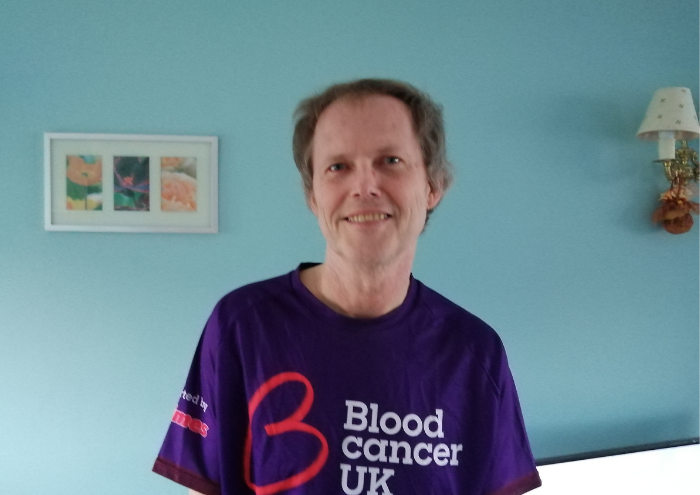“I feel lucky that I can benefit from years of blood cancer research”
Deciding on whether to enrol on a clinical trial can be a tough decision, as David knows all too well. Find out why he eventually said yes to taking part, what he's learned about the process, and how he's benefiting from the research it offers.

I was diagnosed with chronic lymphocytic leukaemia (CLL) in 1997, and had my first treatment from 2003 until 2004, from which point I no longer required treatment as I was on watch and wait. However, in December 2019, I needed treatment again, which led me to enrol on a clinical trial.
Deciding on whether to enrol on a clinical trial is a tough decision, as there is so much to think about.
Considerations include everything from possible side effects to understanding how effective the treatment is likely to be for you.
None of this can be known for sure, so it is all about assessing the probability of success and whether there are better treatment options available to you.
Your treatment team or Blood Cancer UK’s Clinical Trials Support Service can help you to better understand your options, and support you to make a decision that is right for you.

Contact our Clinical Trials Support Service
Get personalised support to understand which clinical trials are available - whether you're a patient, carer or healthcare professional.
Should I take part in a clinical trial?
I began to accept that fatigue was a symptom of my CLL, especially as my blood counts were getting worse. I discussed the options carefully with my consultant, but it transpired that at the time, some of the newer drugs, like venetoclax, were primarily available as frontline treatment or if another targeted therapy had failed. Funding often plays a part in determining what is available.
But it became clear that if I did not have treatment, I would soon become very sick.
Finally, I was given the choice between taking the drug, ibrutinib, at our local hospital, or enrolling on a randomised clinical trial at St. James’s University Hospital.
This clinical trial would test the effectiveness between the two drugs, zanubrutinib or ibrutinib. As part of the trial, two groups of people would randomly be assigned either one of the drugs.
So, why did I say yes?
The St James’s University Hospital is one of several cancer centres of excellence. Therefore, I felt that not only would I receive excellent care, but I would also be very closely monitored.
I had also heard good things about ibrutinib from patients on various chat forums. Some said it had given them a “new lease of life”. So, even though my choice was limited, I was comfortable with my decision. I also liked the idea of contributing to research.
The day I signed the papers was a relief. I was almost too late – the trial had closed by the time I completed the routine screening and my clinicians had to persuade the company sponsoring the trial to accept me.
The lesson here is that you should check with your clinical support team when recruitment will close for the trial.
However, I got the impression that this information is not always straightforward to know and it is not necessarily under the control of the clinicians. This is because the clinical trial will only close when enough patients have been recruited, and it can be hard to predict when that might be.
As part of the randomised trial, I was in the group that was given ibrutinib. I am just over one year into the trial and have seen the progression of my CLL reversed.
I am hopeful that I will achieve remission. It has not been all plain sailing, as my treatment was temporarily halted due to a knee problem, which we had to check wasn’t caused by the treatment. Fortunately, it wasn’t!
I feel lucky, as ibrutinib is a targeted therapy that I can benefit from after years of research into blood cancer.
Finally, I am pleased that I can lend my experiences on Blood Cancer UK’s Clinical Trials Support Service steering panel. This is where I can provide a patient’s perspective on the sort of services that will be most helpful.
